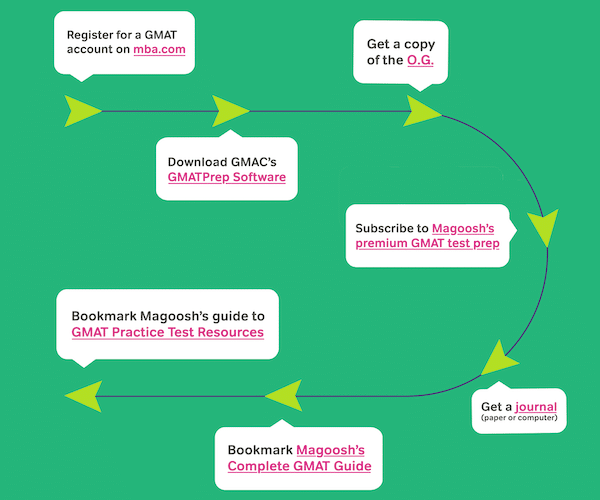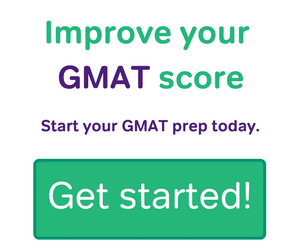Suppose you need to prepare for GMAT in 1 month, starting from square one. You’ll need a good GMAT study guide, dedication, and the willingness to study hard for the next ~30 days. Studying for GMAT in one month might now give you a whole lot of time, but we’re here to help you with this 1 month GMAT study plan to make the best of what you have. 🙂
Table of Contents
- How to Use This Study Schedule
- The study plan:
- Test Day Preparation and What to Bring
How to Use this 1-Month GMAT Study Schedule
This GMAT study plan is not for the faint of heart. It was designed so that you would exhaust most of the questions in the GMAC’s Official Guide for GMAT Review and most of the questions and videos in the Magoosh product. It also supposes you have six days/week and 3-5 hours a day, though it occasionally requires slightly more time.
I know it will be hard to stick to this GMAT schedule if you have a full-time job, children, or other family obligations. If either (or all) of these are the case, we’d suggest reconsidering your GMAT test date. Yes, it’s a little annoying to pay the $50 GMAT rescheduling fee–but it’s far better than taking the exam before you have time to fully prepare and needing to pay a $250-$300 GMAT fee for a retake.
- If possible, follow a three-month or six-month plan.
Though this plan will be time-consuming and require hard work, dedication, and focus to get through, I know you can do it.
- Make sure to give yourself at least one GMAT-free day a week to help you absorb what you’ve studied even better!
- Even though you are dedicating lots of time to GMAT prep this month, you must get 8+ hours of sleep every night since memory encoding takes place in REM sleep.
In that last hour of an eight-hour session of sleep that we get the most REM. Getting an average of 8 hours of sleep vs. an average of 7 hours of sleep every night between now and the test could be as much as a 50 point GMAT score difference.
And why not practice now, pre-business school? After the admissions process and once you’re in your MBA program, sleeping 8 hours will be a lot more difficult!
- Do you need to adapt this study schedule to meet your needs? Check out this blog post for adjustment tips!
Essential Materials

- The official GMAT website, http://mba.com/ – register for an account on the site if you haven’t already.
- Download the Official GMATPrep Software from GMAC.
- GMAC’s The Official Guide for GMAT Review (OG) – The newest edition is the OG2021. If you are going to buy a new guide, get that one.
If you happen to own the OG2020, OG2019, OG2018, OG2017, or even the previous OG2016, then it would be no problem using any of those with this study guide. - Don’t write in the textbooks. Do all your work on separate paper or on a computer. You will want to keep the textbooks clean, so that later, if you need to look at a problem again, it is still fresh and unmarked.
- Magoosh GMAT – sign up for the Premium plan. You can choose between a live cohorted class with an instructor (which includes all our lessons and practice questions) or access to the self-study option by itself.
- A journal (paper or on the computer) – throughout this GMAT schedule, I will ask you to take notes. The actual act of writing or typing creates important links in your brain because you are using your hands. Even if you never have time to review what you have written, just the act of writing it will help you learn a little more deeply.
- Pro tip #1: At the beginning of your journal, write down why you are studying for the GMAT. Refer back to it when you’ve skipped movie night for the third time, when your kids have kept you up late, when you’re just plain tired and frustrated of math, or whenever you need a little extra encouragement!
- Pro tip #2: Taking more detailed notes than what I discuss in this study schedule will help you attain your dream score. Here are some tips on keeping an error log that you’d want to consider.
- Magoosh’s Complete GMAT Guide – This comprehensive web-based guide to the GMAT gives you the quick but useful overview you need to understand this test. You’ll see how the GMAT is designed and scored, what skills it tests, how to find and use the best GMAT prep, and how to study for each test section.
- A guide to GMAT Practice Test Resources – This page includes instructions on where to find good full-length GMAT practice tests, and how to take practice tests and incorporate them into your studies.
Optional/Supplemental Resources
- GMAT Club, online forum
- Beat the GMAT, online forum
- Magoosh GMAT Math Flashcards
- Magoosh Idiom Flashcards
- The Magoosh GMAT Diagnostic Test–a great tool to help you identify your strengths and weaknesses.
Because this one-month GMAT schedule is already filled to the brim with material, we do not include formal practice with the flashcards. If you find these helpful, please integrate work with them where you can.

Abbreviations Used in this Plan
In this plan, we use standard abbreviations for the question types on the GMAT.
- OG = The Official Guide for GMAT Review
Quantitative Questions
- PS = Problem Solving
- DS = Data Sufficiency
Verbal Questions
- RC = Reading Comprehension
- CR = Critical Reasoning
- SC = Sentence Correction
In addition, AWA denotes the Analytical Writing Assessment (the essay at the beginning of the GMAT) and IR denotes the Integrated Reasoning section.

One Month GMAT Study Plan: Week One
* Tasks marked with an asterisk indicate that this resource is only available to Magoosh students—sign up here for a free trial!
Week One, Day One
1) Read the official page on the structure of the test, and follow the four individual links to read about individual question types.
2) Take the GMAT Quant Diagnostic. When you are done, note your score, then check your answers. For questions you got right, glance at the solution, to make sure you got it right for the right reason. For questions you got wrong, study the solutions in detail, taking notes on anything unfamiliar.
3) In the OG
- Read the first half of the Math Review, before the math questions in the OG.
- As you read, write down concepts that are fuzzy/rusty/unfamiliar in your journal.
- Read the introductory section to PS questions, DS questions, RC questions, and CR questions.
- You will find these introductory sections before the banks of that question type.
4) Watch the following Magoosh videos:
- Under the Intro to the GMAT section:
- (OPTIONAL) Intro—Overview of the GMAT
- (OPTIONAL) Intro—Quantitative Section Breakdown
- (OPTIONAL) Intro—Verbal Section Breakdown
- (OPTIONAL) Intro—AWA and IR
- Intro—Computer Adaptive Testing
- Intro—GMAT Scores
- Intro—Pacing, Skipping, and Guessing
- Intro—GMAT vs. GRE
- Intro—Study Plans & Resources
- Intro—Test Day
- Under the Verbal section:
- Under the Math section:
(As you watch these Magoosh videos, take notes in your journal. You will not have time to watch all of them more than once, so take notes to get the most out of each one. Even if you never again look at what you write, the fact that you are writing – and therefore, processing – what is being said will help you remember it.)
5) In the Magoosh product, do:
- 25 math Problem Solving (PS) questions*
- 16 verbal Sentence Correction (SC) questions*
- 9 verbal Reading Comprehension (RC) questions*
Upon completion of each Magoosh question, watch the video following the question whether you got the question right or wrong. As time goes on, and you are comfortable with why you go a question right, just watch the videos for questions you get wrong.
NOTE: when you do Magoosh practice questions, do not select individual topics that are familiar. When you learn a particular lesson, resist the urge to practice that material right there and then. This plan is based on the philosophy that you should see a random mix of topics every time you practice as you move through the OG.
Yes, this means you will make some mistakes in the beginning, especially with topics you haven’t learned thoroughly yet, but if you study those mistakes carefully, that will prime your mind for understanding these ideas more deeply when you get to them in the lessons.
Getting questions wrong at the beginning may seem frustrating, but remember that you are playing a “longer game”: the point is not instant success at the beginning, but building deeper understanding over time. Also, it’s important to get accustomed as soon as possible to the random mix of topics you will see, one after the other, on test day.
Week One, Day Two
1) Take the GMAT Verbal Diagnostic. When you are done, note your score, then check your answers. For questions you got right, glance at the solution, to make sure you got it right for the right reason. For questions you got wrong, study the solutions in detail, taking notes on anything unfamiliar.
2) In the OG:
- Finish the Math Review; as you read, either write down in a separate journal concepts that fuzzy/rusty/unfamiliar.
- Read the introductory section to SC questions, including the “The Eight Sentence Correction Categories” section: as you read, either write down in a separate journal concepts that fuzzy/rusty/unfamiliar. Read the introduction to the AWA and read the entire IR section.
3) Watch the following Magoosh videos:
- Math—Learn from Your Mistakes
- (OPTIONAL) Math—Fundamentals of Data Sufficiency*
- (OPTIONAL) Math—DS Elimination Method
- Math—Two Kinds of DS Questions*
- Math—Avoiding Common DS Mistakes*
- (OPTIONAL) Math—Introductory DS Strategies*
- Math—Properties of Real Numbers*
- (OPTIONAL) Math—Positive and Negative Numbers—I*
- (OPTIONAL) Math—Mental Math, Addition, and Subtraction*
- (OPTIONAL) Math—Positive and Negative Numbers—II*
- (OPTIONAL) AWA—Intro to AWA
- (OPTIONAL) AWA—Intro to Argument Essay
- (OPTIONAL) AWA—Logical Fallacies and the Argument Essay*
- (OPTIONAL) AWA—Brainstorming for AWA*
- (OPTIONAL) AWA—Writing the Argument Essay*
4) In the Magoosh product, do:
Week One, Day Three
1) In the OG, do:
- 25 PS questions
- 15 SC questions
- one RC passage with the associated questions
When you do each batch of OG questions, correct yourself right after, and then read the explanation given whether you got the question right or wrong. At the beginning, be religious about reading the explanations, making sure that, on questions you got right, you got them right for the right reason. As you continue in your studies, you can just scan explanations for question that were easy to get right.
Note that not all the OG explanations are of high quality, and some are not good at all. As an alternative, for all the questions in the OG, you can see much better explanations in our video solutions.
2) Watch the following Magoosh videos:
- (OPTIONAL) Math—Order of Operations*
- (OPTIONAL) Math—Intro to Decimals*
- (OPTIONAL) Math—Multiples of 10*
- (OPTIONAL) Math—Intro to Fractions*
- (OPTIONAL) Math—Conversions with Fractions and Decimals*
- (OPTIONAL) Math—Fraction Properties—I*
- (OPTIONAL) Math—Operations with Fractions*
- (OPTIONAL) Math—Fraction Properties—II*
- Math—Mixed Numerals and Improper Fractions
- (OPTIONAL) Math—Operations with Proportions*
- (OPTIONAL) Verbal—Intro to Parts of Speech
- (OPTIONAL) Verbal—The Roles of Nouns*
- (OPTIONAL) Verbal—Verbs*
- Verbal—Adjectives and Adjectival Phases
- Verbal—Adverbs and Adverbial Phrases*
- (OPTIONAL) Verbal—Conjunctions*
- (OPTIONAL) Verbal—Clauses
- (OPTIONAL) Verbal—Subordinate Clauses*
NOTE: as you finish lesson modules, take the quiz at the end of the module. If you don’t “pass,” then keep reviewing and take it again, until you can pass that quiz.
3) In the Magoosh product, do:
Week One, Day Four
1) In the OG, do:
- 25 math Data Sufficiency (DS) questions
- 15 verbal Critical Reasoning (CR) questions
- one RC passage with the associated questions
2) Watch the following Magoosh videos:
- (OPTIONAL) Math—Word Problems with Fractions*
- Quiz: Arithmetic and Fractions*
- (OPTIONAL) Math—Intro to Percents
- (OPTIONAL) Math—Working with Percents*
- Math—Number Sense and Percents
- (OPTIONAL) Math—Percent Increases and Decreases*
- (OPTIONAL) Math—Sequential Percent Changes
- (OPTIONAL) Math—Simple and Compound Interest*
- (OPTIONAL) Math—Intro to Ratios
- (OPTIONAL) Math—Combining Ratios*
- (OPTIONAL) Math—Ratios and Rates*
- Verbal—Substantive Clauses
- (OPTIONAL) Verbal—Phrases*
- (OPTIONAL) Verbal—Prepositional Phrases*
- (OPTIONAL) Verbal—Appositive Phrases*
- Verbal—Absolute Phrases*
- Verbal—Removing Fluff from Sentences*
- (OPTIONAL) Verbal—Intro to Verbs
- (OPTIONAL) Verbal—Transitive and Intransitive Verbs*
3) In the Magoosh product, do:
Week One, Day Five
1) In the OG, do:
- 15 SC questions
- one RC passage with the associated questions
2) Watch the following Magoosh videos:
- (OPTIONAL) Math—Ratios and Percents*
- Quiz: Percents and Ratios*
- (OPTIONAL) Math—Divisibility*
- (OPTIONAL) Math—Divisibility Rules*
- Math—Multiples
- (OPTIONAL) Math—Prime Numbers*
- (OPTIONAL) Math—Prime Factorization*
- (OPTIONAL) Math—Counting Factors of Large Numbers*
- (OPTIONAL) Math—Squares of Integers*
- (OPTIONAL) Math—Greatest Common Factor*
- Math—Least Common Multiple*
- Verbal—Predicates
- (OPTIONAL) Verbal—Grammar—Auxiliary Verbs*
- (OPTIONAL) Verbal—Grammar—Regular vs. Irregular Verbs*
- (OPTIONAL) Verbal—Verb Tense—Intro and Simple Tenses*
- (OPTIONAL) Verbal—Verb Tense—Progressive Tenses*
- (OPTIONAL) Verbal—Verb Tense—Perfect Tenses*
- Verbal—Verb Tense—Perfect Progressive Tenses*
- Verbal—Verb Mood—Subjunctive*
3) In the Magoosh product, do:
Week One, Day Six (BIG Day):
1) Go to the MBA website and download the free software.
2) Take the first full-length GMAT on the GMAC software. Go through the entire solution after you are done, taking notes in your journal on anything you got wrong.
Older versions of the GMATPrep software (before version 2.5) do not include an AWA question. In that case, to simulate a full GMAT, begin by selecting randomly a prompt from the back of the OG (if you have a pre-2020 edition) or this MBA.com PDF, and then take 30 minutes to write the essay in a word processing program. Then, take the rest of the GMAT using that software.
Shortly after you are done, check all your answers. Write in your journal anything you need to learn from the mistakes you made. The essay you will either share with a trusted friend or mentor, or post in the online forums asking for feedback. See this blog for other options.
As much as possible, try to mimic the GMAT conditions. Give yourself relatively short breaks in between sections. Only eat the kinds of snacks that you are planning to bring to the real GMAT. Note how your sleep the night before affects your work. Note how what you had for dinner the previous night and what you had to eat earlier that day affects your energy level and concentration. Write any observations in your journal.
One Month GMAT Study Plan: Week Two
Week Two, Day One
1) In the OG, do:
- 25 PS questions
- 15 SC questions
- one RC passage with the associated questions
2) Watch the following Magoosh videos:
- (OPTIONAL) Integrated Reasoning—Intro to Integrated Reasoning
- (OPTIONAL) Integrated Reasoning—The IR Calculator*
- (OPTIONAL) Integrated Reasoning—General IR Strategies*
- (OPTIONAL) Integrated Reasoning—Multi-Source Reasoning*
- (OPTIONAL) Integrated Reasoning—Bradley Metalworks 1 (Practice)*
- (OPTIONAL) Integrated Reasoning—Bradley Metalworks 2 (Practice)*
- (OPTIONAL) Integrated Reasoning—Table Analysis*
- (OPTIONAL) Integrated Reasoning—High School Exams (Practice)*
- (OPTIONAL) Integrated Reasoning—Graphics Interpretation*
- (OPTIONAL) Integrated Reasoning—Types of Graphics*
- (OPTIONAL) Math—FOIL Method*
- (OPTIONAL) Math—Multiplying Expressions*
- (OPTIONAL) Math—Simplifying Expressions*
- (OPTIONAL) Math—Intro to Algebra
- Quiz: Integer Properties*
- Math—Integer Properties Strategies
- Math—Remainders*
- (OPTIONAL) Math—Consecutive Integers*
- Math—Testing Cases*
- (OPTIONAL) Math—Even and Odd Integers*
- (OPTIONAL) Math—GCD LCM Formula*
3) In the Magoosh product, do:
Week Two, Day Two
1) In the OG, do:
- 15 CR questions
- one RC passage with the associated questions
2) Watch the following Magoosh videos:
- (OPTIONAL) Integrated Reasoning—Venn Diagrams*
- (OPTIONAL) Integrated Reasoning—Scatterplots*
- (OPTIONAL) Integrated Reasoning—More on Scatterplots*
- (OPTIONAL) Integrated Reasoning—Three Companies (Practice)*
- (OPTIONAL) Integrated Reasoning—Numerical Flowchart (Practice)*
- (OPTIONAL) Integrated Reasoning—Intro to Two-Part Analysis*
- (OPTIONAL) Integrated Reasoning—Verbal Two-Part Analysis*
- (OPTIONAL) Integrated Reasoning—Math Two-Part Analysis*
- (OPTIONAL) Integrated Reasoning—Highway to Hillsborough (Practice)*
- (OPTIONAL) Integrated Reasoning—Algebraic Sequence (Practice)*
- Quiz: Integrated Reasoning*
- (OPTIONAL) Math—Two Equations, Two Unknowns—I*
- (OPTIONAL) Math—Quadratic Equations*
- (OPTIONAL) Math—Eliminating Fractions*
- (OPTIONAL) Math—Basic Equation Solving*
- Math—Factoring—Rational Expressions
- Math—Advanced Numerical Factoring*
- Math—Factoring—Combined*
- (OPTIONAL) Math—Factoring—Quadratics*
- (OPTIONAL) Math—Factoring—Difference of Two Squares*
- (OPTIONAL) Math—Factoring—GCF*
3) In the Magoosh product, do:
Week Two, Day Three
1) In the OG, do:
- 25 PS questions
- 15 SC questions
- one RC passage with the associated questions
2) Watch the following Magoosh videos:
- Math—Two Equations, Two Unknowns—II
- Math—System—Number of Solutions*
- Math—Three Equations with Three Unknowns*
- Math—Absolute Value Equations*
- (OPTIONAL) Math—Function Notation*
- Math—Strange Operators*
- (OPTIONAL) Math—Inequalities—I*
- (OPTIONAL) Math—Inequalities—II*
- Math—Absolute Value Inequalities*
- Math—Simplifying with Substitutions
- Quiz: Algebra, Equations, and Inequalities*
- (OPTIONAL) Verbal—Conditionals*
- Verbal—Grammar—Infinitive Phrases
- Verbal—Grammar—Participial Phrases*
- Verbal—Grammar—Perfect Participles*
- Verbal—Tense of Participial Phrases*
- Verbal—Grammar—Gerunds*
- Verbal—Verb Voice*
- Verbal—More on the Passive Voice*
3) In the Magoosh product, do:
Week Two, Day Four
1) In the OG, do:
- 25 DS questions
- 15 CR questions
- one RC passage with the associated questions
2) Watch the following Magoosh videos:
- (OPTIONAL) Math—Intro to Word Problems
- (OPTIONAL) Math—Assigning Variables*
- (OPTIONAL) Math—Writing Equations*
- (OPTIONAL) Math—Number of Variables*
- (OPTIONAL) Math—Age Questions
- (OPTIONAL) Math—Intro to Motion Questions*
- (OPTIONAL) Math—Average Speed*
- Math—Multiple Traveler Questions
- Math—Shrinking and Expanding Gaps*
- Math—Work Questions
- Verbal—Sequence of Tenses
- Quiz: Sentence Correction—Verb Form*
- Verbal—Subject Verb Agreement—I*
- Verbal—Subject Verb Agreement—II*
- Verbal—Auxiliary Verbs and Subject Verb Agreement*
- Verbal—Introduction to Pronouns
- Verbal—Indefinite Pronouns & Subject Verb Agreement*
- (OPTIONAL) Verbal—Pronoun Agreement—I*
- (OPTIONAL) Verbal—Pronoun Agreement—II*
- Quiz: Sentence Correction—Agreement*
3) In the Magoosh product, do:
Week Two, Day Five
1) In the OG, do:
- 25 PS questions
- 15 SC questions
- one RC passage with the associated questions
2) Watch the following Magoosh videos:
- Math—Grow and Decay
- Math—Mixture Questions*
- Math—Intro to Sets and Venn Diagrams
- Math—Double Matrix Method
- Math—Three Criteria Venn Diagrams*
- (OPTIONAL) Math—Intro to Sequences
- Math—Arithmetic Sequences*
- Math—Recursive Sequences*
- Math—Inclusive Counting*
- Math—Sums of Sequences*
- Verbal—Infinitive of Purpose
- Verbal—The Missing Verb Mistake
- Verbal—The Double Subject Mistake*
- Verbal—Run-On Sentences*
- Quiz: Sentence Correction—Grammatical Construction*
- (OPTIONAL) Verbal—Intro to Parallelism
- Verbal—The Once Outside, Twice Inside Rule*
- Verbal—More on Inside & Outside*
- Verbal—Omitting Words in Parallelism
3) In the Magoosh product, do:
Week Two, Day Six (BIG Day)
1) Take the second full-length GMAT on the GMAC software. Go through the entire solution after you are done, taking notes in your journal on anything you got wrong.
Older versions of the GMATPrep software (before version 2.5) do not include an AWA question. In that case, to simulate a full GMAT, begin by selecting randomly a prompt from the back of the OG (if you have a pre-2020 edition) or this MBA.com PDF, and then take 30 minutes to write the essay in a word processing program. Then, take the rest of the GMAT using that software.
Shortly after you are done, check all your answers. Write in your journal anything you need to learn from the mistakes you made. The essay you will either share with a trusted friend or mentor, or post in the online forums asking for feedback.
As much as possible, try to mimic the GMAT conditions. Give yourself relatively short breaks in between sections. Only eat the kinds of snacks that you are planning to bring to the real GMAT. Note how your sleep the night before affects your work. Note how what you had for dinner the previous night and what you had to eat earlier that day affects your energy level and concentration. Write any observations in your journal.
One Month GMAT Study Plan: Week Three
Week Three, Day One
1) In the OG, do:
- 25 PS questions
- 15 CR questions
- one RC passage with the associated questions
2) Watch the following Magoosh videos:
- Math—Backsolving
- Math—Intro to VICS*
- Math—VICs—Algebraic Approach*
- Math—VICs—Picking Numbers*
- Quiz: Word Problems*
- (OPTIONAL) Math—Intro to Exponents
- (OPTIONAL) Math—Laws of Exponents—I*
- (OPTIONAL) Math—Negative Exponents*
- (OPTIONAL) Math—Laws of Exponents—II*
- (OPTIONAL) Math—Units Digit Questions*
- Verbal—False Parallelism
- Verbal—Comparatives and Superlatives*
- (OPTIONAL) Verbal—Intro to Comparisons
- Verbal—Omitting Words in Comparisons*
- Verbal—Comparisons: Like vs. As*
- Quiz: Sentence Correction—Parallelism*
- Verbal—Adverbs & Adjectives*
- (OPTIONAL) Verbal—Intro to Modifiers
- Verbal—Relative Clause Modifiers*
3) In the Magoosh product, do:
Week Three, Day Two
1) In the OG, do:
- 25 DS questions
- 15 SC questions
- one RC passage with the associated questions
2) Watch the following Magoosh videos:
- (OPTIONAL) Math—Square Roots
- (OPTIONAL) Math—Other Roots*
- (OPTIONAL) Math—Simplifying Roots*
- (OPTIONAL) Math—Operations with Roots*
- Math—Equations with Square Roots
- Math—Fractional Exponents*
- Math—Exponential Equations*
- (OPTIONAL) Math—Rationalizing*
- (OPTIONAL) Math—Working with Formulas*
- Quiz: Powers and Roots*
- Verbal—Vital Noun Modifiers
- Verbal—Exceptions to the Touch Rule*
- Verbal—Word Order with Adverbs*
- Verbs—Illogical Predication*
- Quiz: Sentence Correction—Logical Predication*
- Verbal—Introduction to Diction*
- Verbal—Lie vs. Lay*
- Verbal—If vs. Whether*
- Verbal—Countable vs. Uncountable*
3) In the Magoosh product, do:
Week Three, Day Three
1) In the OG, do:
- 15 CR questions
- one RC passage with the associated questions
2) Watch the following Magoosh videos:
- (OPTIONAL) Math—Lines and Angles
- Math—Triangles—Part I
- (OPTIONAL) Math—Assumptions and Estimation
- (OPTIONAL) Math—Geometry Strategies—Part I*
- (OPTIONAL) Math—Triangles—Part II*
- (OPTIONAL) Math—Right Triangles
- (OPTIONAL) Math—Similar Triangles*
- (OPTIONAL) Math—Special Right Triangles*
- (OPTIONAL) Math—Quadrilaterals*
- Math—Area of Quadrilaterals*
- Verbal—Rather than vs. Instead of
- Verbal–Because of vs. Due to*
- Verbal—Diction: Like vs. Such as*
- Quiz: Sentence Correction—Diction*
- Verbal—Idioms*
- Quiz: Sentence Correction: Idioms*
- Verbal—Verbs and Active Language
- Verbal—Subject-Verb Proximity*
- Verbal—Focus on a Topic*
- Verbal—Avoid Redundancy*
3) In the Magoosh product, do:
4) Go to GMAC’s official IR practice questions: Use the access code given in the back of the OG, logging in here. This site contains the online version of all the questions in the OG, in case you want to practice the identical questions online instead of on paper; in addition, the official IR practice questions live here.
Uncheck everything else and do the first twelve Multi-Source Reasoning questions, questions #1-12, setting yourself a 30 minute time limit. When you are done, go back and read carefully the full explanation for each question. Take notes on anything you need to remember.
Week Three, Day Four
1) In the OG, do:
- 25 DS questions
- 15 SC questions
- one RC passage with the associated questions
2) Watch the following Magoosh videos:
- (OPTIONAL) Math—Polygons*
- Math—Regular Polygons
- (OPTIONAL) Math—Circles*
- (OPTIONAL) Math—Circle Properties*
- Math—Circles, Arcs, and Sectors*
- (OPTIONAL) Math—Volume and Surface Area*
- (OPTIONAL) Math—Units of Measurement*
- (OPTIONAL) Math—Geometry Strategies—Part II
- Quiz: Geometry*
- (OPTIONAL) Math—The Coordinate Plane*
- (OPTIONAL) Math—Graphing Lines*
- Verbal—Concision I—Keep It Short
- Verbal—Concision II—Not Too Short*
- Quiz: Sentence Correction—Rhetorical Construction*
- Verbal—Meaning*
- Verbal—Summary of SC Strategies*
- Verbal—Sentence Correction Exercise #1*
- Verbal—Sentence Correction Example #2*
- (OPTIONAL) Verbal—Intro to Reading Comprehension
- Verbal—Approaching the Passage
3) In the Magoosh product, do:
Week Three, Day Five
1) In the OG, do:
- 25 PS questions
- 15 CR questions
- one RC passage with the associated questions
2) Watch the following Magoosh videos:
- (OPTIONAL) Math—Vertical and Horizontal Lines*
- (OPTIONAL) Math—Slope*
- (OPTIONAL) Math—Intercepts*
- (OPTIONAL) Math—Slope-Intercept Form*
- (OPTIONAL) Math—Writing Equations of Lines*
- Math—Distance Between Two Points
- Math—Reflections in the x-y Plane*
- Quiz: Coordinate Geometry*
- (OPTIONAL) Math—Mean, Median, Mode*
- (OPTIONAL) Math—More on Mean and Median*
- Verbal—Understanding Structure
- Verbal—Dissecting the Passage*
- Verbal—Approaching the Question*
- Verbal—Answer Choice Traps*
- (OPTIONAL) Verbal—Primary Purpose
- (OPTIONAL) Verbal—Detail Questions*
- Verbal—Inference Questions
- Verbal—Miscellaneous RC Tip*
3) In the Magoosh product, do:
Week Three, Day Six (BIG Day)
1) Retake the first full length GMAT on the GMAC software. Because the software has a larger question pool than the number of questions on each test, you will usually see many new questions as well as a few repeats (which are great for review).
Older versions of the GMATPrep software (before version 2.5) do not include an AWA question. In that case, to simulate a full GMAT, begin by selecting randomly a prompt from the back of the OG (if you have a pre-2020 edition) or this MBA.com PDF, and then take 30 minutes to write the essay in a word processing program. Then, take the rest of the GMAT using that software.
Shortly after you are done, check all your answers. Write in your journal anything you need to learn from the mistakes you made. The essay you will either share with a trusted friend or mentor, or post in the online forums asking for feedback.
As much as possible, try to mimic the GMAT conditions. Give yourself relatively short breaks in between sections. Only eat the kinds of snacks that you are planning to bring to the real GMAT. Note how your sleep the night before affects your work. Note how what you had for dinner the previous night and what you had to eat earlier that day affects your energy level and concentration. Write any observations in your journal.
One Month GMAT Study Plan: Week Four
Week Four, Day One
1) In the OG, do:
- 25 PS questions
- 15 SC questions
- one RC passage with the associated questions
2) Watch the following Magoosh videos:
- (OPTIONAL) Math—Weighted Averages I*
- Math—Weighted Averages II (Advanced)
- Math—Range and Standard Deviation*
- Math—More on Standard Deviation*
- Math—The Normal Distribution*
- Quiz: Statistics*
- (OPTIONAL) Math—Introduction to Counting*
- Math—Fundamental Counting Principle*
- Math—FCP with Restrictions*
- Math—Factorial Notation*
- (OPTIONAL) Math—Alternative Methods*
- Verbal—RC Example, Passage #1, Path Dependence
- Verbal—RC Example, Passage #1, Question #1*
- Verbal—RC Example, Passage #1, Question #2*
- Verbal—RC Example, Passage #2, Office Organization*
- Verbal—RC Example, Passage #2, Question #1*
- Verbal—RC Example, Passage #2, Question #2*
- Quiz: Reading Comprehension*
- Verbal—Intro to Critical Reasoning
- Verbal—Dissecting an Argument*
3) Go back to GMAC’s official IR practice questions: Use the access code given in the back of the OG, logging in here. This site contains the online version of all the questions in the OG, in case you want to practice the identical questions online instead of on paper; in addition, the official IR practice questions live here.
Uncheck everything else and do the last six Multi-Source Reasoning questions, questions #12-18, and all six Table Analysis questions, setting yourself a 30 minute time limit for all twelve questions. When you are done, go back and read carefully the full explanation for each question. Take notes on anything you need to remember.
Week Four, Day Two
1) In the OG, do:
- 15 CR questions
- one RC passage with the associated questions
2) Watch the following Magoosh videos:
- Math—Counting with Identical Items
- (OPTIONAL) Math—Eliminating Repetition*
- Math—Combinations*
- Math—When to Use Combinations*
- Math—Calculating Combinations*
- (OPTIONAL) Math—Permutations and Combinations*
- Math—Counting Strategies*
- Quiz: Counting*
- Math—Intro to Probability
- Math—Complementary Events and Simple Rules*
- Math—Mutually Exclusive Events*
- Verbal—Common Argument Types
- Verbal—General CR Strategy*
- (OPTIONAL) Verbal—Weakening the Argument*
- (OPTIONAL) Verbal—Strengthening the Argument*
- Verbal—Assumption Questions*
- Verbal—Trap Answers*
- Verbal—Conclusion and Inference*
- Verbal—Bold-Faced Questions*
3) In the Magoosh product, do:
4) Go back to GMAC’s official IR practice questions: Use the access code given in the back of the OG, logging in here. This site contains the online version of all the questions in the OG, in case you want to practice the identical questions online instead of on paper; in addition, the official IR practice questions live here.
Uncheck everything else and do all ten Graphics Interpretation questions, setting yourself a 25 minute time limit. When you are done, go back and read carefully the full explanation for each question. Take notes on anything you need to remember.
Week Four, Day Three
1) In the OG, do:
- 25 PS questions
- 15 SC questions
- one RC passage with the associated questions
2) Watch the following Magoosh videos:
- (OPTIONAL) Math—Probability of Event A OR Event B*
- (OPTIONAL) Math—Examples of the OR Rule*
- (OPTIONAL) Math—Independent Events*
- (OPTIONAL) Math—Examples of the AND Rule*
- (OPTIONAL) Math—Generalized AND Rule*
- (OPTIONAL) Math—Examples of Generalized AND Rule*
- Math—Binomial Situation
- Math—The “At Least” Scenario*
- Math—Analyzing Questions*
- Math—Using Counting Techniques*
- (OPTIONAL) Verbal—Flawed Argument Questions*
- (OPTIONAL) Verbal—Paradox Questions*
- (OPTIONAL) Verbal—Evaluating the Conclusion*
- Verbal—Miscellaneous CR Tips
- Verbal—Critical Reasoning Example #1*
- Verbal—Critical Reasoning Example #2*
- Quiz: Critical Reasoning*
3) In the Magoosh product, do:
4) Go back to GMAC’s official IR practice questions: Use the access code given in the back of the OG, logging in here. This site contains the online version of all the questions in the OG, in case you want to practice the identical questions online instead of on paper; in addition, the official IR practice questions live here.
Uncheck everything else and do all sixteen Two-Part Analysis questions, setting yourself a 40 minute time limit. When you are done, go back and read carefully the full explanation for each question. Take notes on anything you need to remember.
Week Four, Day Four
1) In the OG, do:
- 25 DS questions
- 15 CR questions
- one RC passage with the associated questions
2) Read the AWA Argument prompts in the OG (if you have a pre-2020 edition). While GMAC has removed their list of AWA prompts from the 2020 and 2021 OG, you can still find the GMAT essay prompts on this MBA.com PDF. Pick a prompt at random, write an essay in half an hour; get a friend or mentor to critique it, or submit it on the online forums for critique.
3) Watch the following Magoosh videos:
- (OPTIONAL) Math—Listing vs. Counting vs. Probability Rules*
- (OPTIONAL) Math—General Probability Strategies*
- Quiz: Probability*
- Math—Guessing Strategies
- (OPTIONAL) Math—Word Problems, Summarizing Information*
- (OPTIONAL) Math—Rephrasing the Question*
- (OPTIONAL) Math—Picking Numbers for DS*
- Math—Strategies for Picking Numbers*
- Math—DS Geometry Question*
- Math—DS Algebra Strategies*
- Math—Tautological Statements*
4) In the Magoosh product, do:
Week Four, Day Five
1) In the OG, do:
- 25 PS questions
- 15 SC questions
- one RC passage with the associated questions
2) Watch the following Magoosh videos:
3) In the Magoosh product, do:
Week Four, Day Six (BIG Day, if this is NOT the day before the real GMAT)
1) Retake the second full-length GMAT on the GMAC software. Because the software has a larger question pool than the number of questions on each test, you will usually see many new questions as well as a few repeats (which are great for review).
Older versions of the GMATPrep software (before version 2.5) do not include an AWA question. In that case, to simulate a full GMAT, begin by selecting randomly a prompt from the back of the OG (if you have a pre-2020 edition) or this MBA.com PDF, and then take 30 minutes to write the essay in a word processing program. Then, take the rest of the GMAT using that software.
Shortly after you are done, check all your answers. Write in your journal anything you need to learn from the mistakes you made. The essay you will either share with a trusted friend or mentor, or post in the online forums asking for feedback.
As much as possible, try to mimic the GMAT conditions. Give yourself relatively short breaks in between sections. Only eat the kinds of snacks that you are planning to bring to the real GMAT. Note how your sleep the night before affects your work. Note how what you had for dinner the previous night and what you had to eat earlier that day affects your energy level and concentration. Write any observations in your journal.
Any Extra Days
- In the OG, sample the remaining SC & CR questions
- Write another essay from OG (pre-2020 editions) or this MBA.com PDF, and get a critique of it
- Complete any remaining Magoosh questions for which you have time
Day Before the Test
- No GMAT preparation all day
- Eat a large, healthy, leisurely dinner – no alcohol!
- Go to bed earlier than usual
- Take every break you’re offered during the exam
Day of the GMAT
- ABSOLUTELY NO LAST-MINUTE GMAT PREPARATION!
- Eat a large breakfast, full of protein
- Do relaxing, fun activities to pass time until the test
- On breaks, make sure to get up, move & stretch – moving & stretching the large muscles of the body (legs & torso) will get oxygen flowing throughout, which will help keep you awake and keep you thinking clearly
Bring to the Test
- A valid legal ID, ensure your name matches your GMAT registration
- A light sweater in case the test room gets chilly
- A list of schools to which you’d like to send your score
- A liter of water
- Healthy energy-packed snacks (nuts, protein bar, etc.)
For relaxation tips, see this post.
Any questions on this plan? Just leave us a comment and we’ll do our best to help!
Editor’s Note: This post was originally published in December 2012 and has been updated for freshness, accuracy, and comprehensiveness.











Leave a Reply